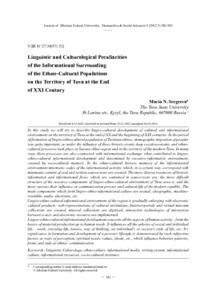Лингвокультурологические особенности информационной среды этнокультурных популяций на территории Тувы в конце XX - начале XXI вв.
Скачать файл:
URI (для ссылок/цитирований):
https://elib.sfu-kras.ru/handle/2311/2831Автор:
Сергеева, М.Н.
Sergeeva, Maria N.
Дата:
2012-04Аннотация:
In this study we will try to describe lingvo-cultural development of cultural and informational
environment on the territory of Tuva at the end of XX and the beginning of XXI centuries. In the period
of formation of lingvo-ethnocultural population of Tuvinian ethnos, demographic migration of peoples
was quite important, as under the influence of these historic events deep social-economic and ethnocultural
processes took place in Sayano-Altai region and in the territory of the modern Tuva. In many
ways these processes are also connected with informational exchange, what contributed to lingvoethno-
cultural informational development and determined by recourse-informative environment,
created by sociocultural memory. In the ethno-cultural historic memory of the informational
environment mnemonic codes of the informational activity, which, in a certain way, correspond with
mnemonic content of oral and written source-texts are created. The more diverse resources of historic
information and informational flows, which are contained in source-texts are, the more difficult
structure of the resource components of lingvo-ethno-cultural environment of Tuva area is, and the
more various their influence on communication process and cultural life of the modern republic. The
main components which form lingvo-ethno-informational culture are textual, ideographic, machinereadable,
audio, electronic, etc.
Lingvo-ethno-cultural informational environment of the region is gradually enlarging with electronic
cultural products: web-representations of cultural institutions, Internet-portals and virtual museum
collections are created, musical collections are digitized, interactive technologies of interaction
between a user and electronic resource are implemented.
Lingvo-ethno-cultural informational development concerns all the aspects of human activity - from the
basics of material production up to human needs. It influences all the spheres of social and individual
life - work, everyday life, leisure, way of thinking, an individuals or societys style of life, etc. Its
significance in formation and development of a persons lifestyle is demonstrated by such subjective
factors as ways of perception, spiritual needs, values, ideals, etc., which influence behavior patterns,
forms and style of ethnos communication В статье мы попытаемся описать лингвокультурологическое развитие культурно-
информационной среды на территории Тувы в конце XX - начале XXI вв. В период
формирования лингво-этнокультурной популяции тувинского этноса немаловажное значение
имело демографическое переселение народов, под влиянием этих исторических событий
происходили глубокие социально-экономические, этнокультурные процессы в Саяно-Алтайском
регионе, в том числе на территории современной Тувы. Во многом эти процессы связаны и с
информационным обменом, что способствовало лингвоэтнокультурному информационному
развитию. В этнокультурной исторической памяти информационной среды создаются
мнемонические коды информационной деятельности, которые определенным образом
соотносятся с мнемоническим содержанием устных и письменных текстов-источников. Чем
разнообразнее ресурсы исторической информации, информационные потоки, закрепленные
в текстах-источниках, тем сложнее структурированы ресурсные компоненты лингво-
этнокультурного ареала Тувы, разнообразнее их влияние на коммуникационные процессы и
культурную жизнь современной республики. Основные компоненты, формирующие лингво-
этноинформационную культуру, - это текстовые, идеографические, машиночитаемые,
аудиальные, электронные и т.д.
Лингвоэтнокультурное информационное пространство региона постепенно наполняется
электронными культурными продуктами: создаются веб-представительства учреждений
культуры и веб-порталы, виртуальные музейные коллекции, оцифровываются музыкальные
коллекции и т.д., внедряются интерактивные технологии взаимодействия пользователя и
электронного ресурса.
Лингвоэтнокультурное информационное развитие пронизывает все аспекты человеческой
жизнедеятельности - от основ материального производства и до потребностей человека. Оно
воздействует на все сферы общественной и индивидуальной жизнедеятельности - труд, быт,
досуг, стиль мышления, образ жизни индивида и общества и пр. Значение ее в формировании и
развитии образа жизни человека проявляется через действие таких субъективных факторов,
как установки сознания, духовные потребности, ценности, идеалы и т. д., которые влияют на
характер поведения, формы и стиль общения этноса.
Коллекции:
Метаданные:
Показать полную информациюСвязанные материалы
Показаны похожие ресурсы по названию, автору или тематике.
-
Культурная информация/память и эстетическая информация в художественном переводе
Разумовская, В.А.; Razumovskaya, Veronica A. (Сибирский федеральный университет. Siberian Federal University., 2012-06)This article deals with the problems of storage of cultural information and cultural memory as well as aesthetic information in literary text. Particularly great attention is paid to different types of culturonyms and the ... -
Развитие критического мышления на уроках информатики
Арсеньев, К.С.; Arseniev, Kirill S. (Сибирский федеральный университет. Siberian Federal University., 2011-05)In modern scientific practice, there is a huge number of terms and concepts related to pupils informational alertness such as informational literacy, bibliographic culture, multimedia literacy and others. Professor KemSUCA ... -
Современная картина мира культуры и Web-пространство
Басалаева, О.Г.; Basalaeva, Oksana G.; Балабанов, П.И.; Balabanov, Pavel I. (Сибирский федеральный университет. Siberian Federal University., 2010-04)В статье рассматривается информационный подход, в рамках которого происходит возрождение интереса к культурной картине мира в условиях формирования Web-пространства, что значительно отличает современную картину мира культуры ... -
Development of Bachelor`S Physical Culture Competences
Manzheley, Irina V.; Cherniakova, Svetlana N.; Манжелей, И.В.; Чернякова, С.Н. (Сибирский федеральный университет. Siberian Federal University., 2014-07)The subject of the research is to find ways for improving physical education of students in accordance with the current challenges based on the competence-building approach. The purpose of the paper is to develop a structure ... -
Особенности формирования языковой культуры специалиста в свете концептуальных положений коммуникативно-информационного развития
Kachalov, Nikolay A.; Качалов, Н.А.; Tarasova, Yekaterina S.; Тарасова, Е.С. (Сибирский федеральный университет. Siberian Federal University., 2013-04)The article considers components of the (foreign language, professional and information) general culture of a specialist, the content of components and functions of the foreign language culture.

